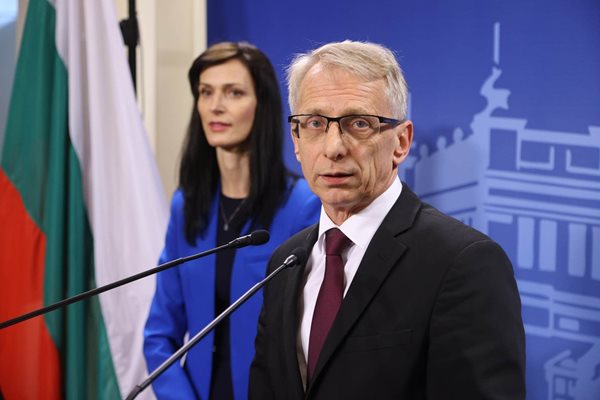By Teodora Yovcheva (University of Sofia)
Two months after the elections on 2 April following a cycle of early parliamentary elections, Bulgaria has its first government with rotation of the prime ministers. The government was a result of the tough negotiations between antagonists – GERB-SDS (Citizens for European Development of Bulgaria – Union of Democratic Forces) and PP-DB (“We continue the change” and Democratic Bulgaria). A few times, setbacks indicated that government would not be formed. However, after several critical points GERB-SDS and PP-DB agreed on joint Denkov (PP)-Gabriel (GERB) government with a rotation of the prime ministers. First prime-minister is Nikolay Denkov (PP) for a period of 9 months. Then the cabinet is supposed to resign and the same composition, but with different prime-minister (Maria Gabriel from GERB) will be voted in the parliament.
How did we get here?
The situation in Bulgaria was not very optimistic in the last two years. The increasing polarization, fragmentation and the unwillingness of parties to cooperate led to a series of early parliamentary elections. The polarization has taken several different forms. First, the parties was divided regarding their attitude toward the then ruling party GERB and its leader Boyko Borissov. Second, after the start of the war in Ukraine, the parties opposed on geopolitical issues. This led to inability of the parties to form government. On top of that, several parties and alliances entered the parliament and lost representation fast. The election cycle started with the regular parliamentary election in April 2021, which GERB-SDS won, but government was not formed. The early elections repeated two more times changing the winner between newly formed “There is such a people” (July 2021) and “We continue the change” (November 2021) when finally a heterogeneous coalition between Socialists (Bulgarian Socialist Party), populists (“There is such a people”), centrists (Democratic Bulgaria) and newly formed alliance “We continue the change” was formed. However, it was overthrown by a vote of no confidence in June 2022 after one of the partners, “There is such a people” withdrew its support for the cabinet. After the early parliamentary election in October 2022, again the parties refused to cooperate in governmental arena, which led to another early parliamentary election in April 2023.
Circumstances – game-changing aspects
The outcomes of the election in April was also not encouraging regarding the chances for forming a stable government. Neither the fragmentation, nor polarization were reduced. Besides, several other actors made their moves. A member of parliament released records from a PP’ party meeting where the co-leaders share sensitive information and prospects about forming a coalition with GERB-SDS. As a result, the president Rumen Radev took hard position demonstrating his attitude toward the future coalition. While giving the PP mandate for forming a government, he practically advised him to rethink the possibility of doing it. His attitude was unprecedented and boosted several protests against him. On top of that, the prosecutor’s office demonstrated striking activity by requesting the removal of the immunity of MPs from different parties, including the ones of the leader of GERB Boyko Borissov and the co-leader of PP – Kiril Petkov. In the negotiations for government, a reform in prosecution and especially the removal of the Chief Prosecutor Ivan Geshev was disccused.
Challenges before the new government
Under such unprecedented circumstances finally a government between GERB-SDS and PP-DB was formed. The partners in the government were antagonists during the campaign. Nevertheless, the unusual situation and parties’ common geopolitical priorities stimulated them to cooperate, which put an end to a vicious cycle of early parliamentary elections at least for now. First, they agree on a rotating chairmanship of the parliament. After a series of negotiations, PP-DB and GERB-SDS agree on joint government. The profile of the cabinet is considered strongly pro-European having the parties supporting it and the presence of the former European Commissioner Maria Gabriel. It is also demonstrated by prioritizing the affiliation of Bulgaria to Eurozone and Schengen agreement. The main problems however are the lack of trust between partners and the short horizon of the government – year and a half (9 months for each of the prime-ministers). The lack of trust makes the government fragile. This fragility is also nourished by the fact that cooperation is unpopular and every of the partners may desert which would prevent the execution of the tasks. While the very fact that government with clear pro-European agenda was formed is a success for Bulgaria, the dangerous aspects remain. However, this effort would worth if they key priorities are achieved – the affiliation of Bulgaria to Eurozone and Schengen agreement.
Will the rotation system work? So far, we have little evidence about the success rate of such formula. The Israeli case did not bring much enthusiasm. Nevertheless, if the cabinet succeeds, the abovementioned priorities will be considered effective on the background of party’s lacuna in executive power.
Photo source: https://www.24chasa.bg/bulgaria/article/14519877


